Wednesday, 11 February 2009
 OTTAWA. WEDNESDAY, FEBRUARY 11, 2009. 8 PM ET. The dubiously prorogued Parliament of Canada has been back in business some two and a half weeks. It now has a more or less big economic stimulus budget to its credit — though is it big enough, etc, etc? And it is time to wrap up our already too-long report on the late January return of the (sometimes) honourable MPs. A sentence from the morning paper helps frame the new bottom line: "A Strategic Counsel poll for The Globe and Mail-CTV News taken Feb. 5-8 shows the Liberals leading the Tories 33-32. A Harris-Decima poll has a similar finding, with the Liberals up 33-31." But in case you think this means new Liberal leader Michael Ignatieff is about to inherit the family farm, think again. In some ways yesterday’s Israeli election may be a better model for the near future of Canadian federal politics ("In Israeli Vote, With Two Parties Nearly Tied, the Winner Is Gridlock"). Last fall’s sudden surprise coalition has faded — for its main purpose at least. But Mr. Ignatieff does not seem well positioned in Western Canada, and perhaps rural Ontario too. The brief burst of Conservative support early this past December has vanished. Now even the friendly right-thinking pundit Don Martin is saying: "there is circumstantial evidence to back the possibility of a shocking departure by Stephen Harper later this year or next." Mr. Layton and M. Duceppe are just hanging on. The current best answer to "who’s winning in Ottawa?" is none of the above. (And does anyone even remember that Elizabeth May is still leader of the Green Party of Canada, which still has no MPs at all?) OTTAWA. WEDNESDAY, FEBRUARY 11, 2009. 8 PM ET. The dubiously prorogued Parliament of Canada has been back in business some two and a half weeks. It now has a more or less big economic stimulus budget to its credit — though is it big enough, etc, etc? And it is time to wrap up our already too-long report on the late January return of the (sometimes) honourable MPs. A sentence from the morning paper helps frame the new bottom line: "A Strategic Counsel poll for The Globe and Mail-CTV News taken Feb. 5-8 shows the Liberals leading the Tories 33-32. A Harris-Decima poll has a similar finding, with the Liberals up 33-31." But in case you think this means new Liberal leader Michael Ignatieff is about to inherit the family farm, think again. In some ways yesterday’s Israeli election may be a better model for the near future of Canadian federal politics ("In Israeli Vote, With Two Parties Nearly Tied, the Winner Is Gridlock"). Last fall’s sudden surprise coalition has faded — for its main purpose at least. But Mr. Ignatieff does not seem well positioned in Western Canada, and perhaps rural Ontario too. The brief burst of Conservative support early this past December has vanished. Now even the friendly right-thinking pundit Don Martin is saying: "there is circumstantial evidence to back the possibility of a shocking departure by Stephen Harper later this year or next." Mr. Layton and M. Duceppe are just hanging on. The current best answer to "who’s winning in Ottawa?" is none of the above. (And does anyone even remember that Elizabeth May is still leader of the Green Party of Canada, which still has no MPs at all?)
Looking closer at the Strategic Counsel and Harris-Decima polls ... Canadian regionalism is coming home with a vengeance (even if you forget all about Quebec)?
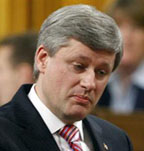 There is one notable finer point about the morning paper’s report that a "Strategic Counsel poll for The Globe and Mail-CTV News taken Feb. 5-8 shows the Liberals leading the Tories 33-32," while a "Harris-Decima poll has a similar finding, with the Liberals up 33-31." When you look at the actual company documents, the numbers here apparently refer to the Harris-Decima results for Jan. 29–Feb. 2. According to the Harris-Decima results for Feb. 5–8: "Nationally, the Conservatives lead with 33%, followed by the Liberals at 31%." (And, btw: "the NDP at 15%, the Greens at 10% and the BQ at 10%.") There is one notable finer point about the morning paper’s report that a "Strategic Counsel poll for The Globe and Mail-CTV News taken Feb. 5-8 shows the Liberals leading the Tories 33-32," while a "Harris-Decima poll has a similar finding, with the Liberals up 33-31." When you look at the actual company documents, the numbers here apparently refer to the Harris-Decima results for Jan. 29–Feb. 2. According to the Harris-Decima results for Feb. 5–8: "Nationally, the Conservatives lead with 33%, followed by the Liberals at 31%." (And, btw: "the NDP at 15%, the Greens at 10% and the BQ at 10%.")
There are also some intriguing differences between the Harris-Decima and Strategic Counsel regional results for Feb. 5–8. According to Harris-Decima here: "In Ontario, the Liberals and Conservatives are tied with 37% each, followed by the NDP at 16% and the Greens at 9%. In Quebec, the BQ leads with 41%, followed by the Liberals at 27%, the Conservatives 16%, the NDP 10% and the Greens 4%."
According to the Strategic Counsel for Feb. 5–8, however, the Ontario results are Liberals 43%, Conservatives 28%, NDP 20%, and Green Party 9%. The Quebec results here seem a bit confused, with the Green Party showing surprising strength, and the Liberals actually ahead of the Bloc, as well as the Conservatives and NDP. But the most striking Strategic Counsel results are perhaps for "the West" (numbers for which are not broken out in the Harris-Decima document). Here we have Conservatives 50%, Liberals 24%, NDP 16%, and Green Party 10%.
 What especially the Strategic Counsel but also (in some degree) the Harris-Decima polls for Feb. 5–8 seem to be broadly suggesting, in any case, is that the Liberals under their new leader, Mr. Ignatieff (or just plain Iggy to his friends?) have now recovered their more traditional ground in Ontario and Quebec. (And one might guess this would be even more true in Atlantic Canada as well, if this were broken out in reliable numbers.) But Stephen Harper’s Conservatives continue to rule the roost in Western Canada — and by a quite significant margin. What especially the Strategic Counsel but also (in some degree) the Harris-Decima polls for Feb. 5–8 seem to be broadly suggesting, in any case, is that the Liberals under their new leader, Mr. Ignatieff (or just plain Iggy to his friends?) have now recovered their more traditional ground in Ontario and Quebec. (And one might guess this would be even more true in Atlantic Canada as well, if this were broken out in reliable numbers.) But Stephen Harper’s Conservatives continue to rule the roost in Western Canada — and by a quite significant margin.
What, so to speak, moral or Canadian national authority Mr. Harper’s minority government continues to enjoy, that is to say, still turns around its unique command of Western support. Whatever else, it has ended "Western alienation" and brought the West "in" to the legendary corridors of federal power in Ottawa. It still seems clear that this is not a feat even Michael Ignatieff’s Liberals will be able to replicate. (At least all by themselves? Or could this be one of several contexts in which some sort of Liberal-NDP coalition would still make sense?)
At the same time, two years ago this unique regional strength of the Harper minority government seemed to be given some extra practical force in the world of economic realpolitik by the unique strength of the Western Canadian resource economy — and especially of course the energy economy in Mr. Harper’s adopted home province of Alberta. Most recently, this may be changing somewhat as well. See, e.g.: "Western Canada hit hardest by decline ... B.C. and Alberta see swifter, sharper downturn than other provinces as housing slumps and bankruptcies soar." (And this may develop into a repeat of another old story, from back in the recession of the early 1980s — though this time Alberta won’t be able to blame some new national policy, emanating from the bowels of the federal bureaucracy?)
Canadian politics has never been remotely high-minded ... so why should we expect anything different now ... except now (even setting the new Great Recession aside) there are especially troublesome structural dysfunctions in Ottawa ... at some point in the not entirely distant future there will have to be a real Age of Reform ... at last ????
 This heading is enough of a mouthful to leave all on its own ... This heading is enough of a mouthful to leave all on its own ...
Very, very briefly, one thing Canadian federal politics over the past several months has brought home yet again to us is the increasingly urgent need to reform and democratize the office of Governor General. We may well be at just the beginning of an extended era of minority government in Ottawa — in which the Governor General will be forced to play an increasingly important role, deciding whether to hold fresh elections or ask an opposition coalition to try forming a workable parliamentary majority, and so forth.
People in the thick of things in Ottawa now don’t want to criticize the way the Governor General is currently appointed, by the prime minister of the day alone, for fear of reducing the legitimacy of the office in difficult times. But we mere citizens can afford to be more open and honest. The recent decision to prorogue Parliament, to avoid the defeat of the Harper minority government, may have been an ultimately wise decision, from the standpoint of practical politics. But it remains troubling and dubious, partly because of the lingering suspicion that the Governor General had no real choice but to agree with the Prime Minister’s request.
 A more popularly elected Governor General could be a much more convincing democratic check and balance in such cases. And those who say this would somehow ruin our parliamentary democracy should look at how the present-day parliamentary democracies of Ireland or India work — to take just two of many potential cases in point! A more popularly elected Governor General could be a much more convincing democratic check and balance in such cases. And those who say this would somehow ruin our parliamentary democracy should look at how the present-day parliamentary democracies of Ireland or India work — to take just two of many potential cases in point!
We won’t go on further for the moment ...
Except to say that now Mr. Harper has so wantonly dropped the ball on democratic Senate reform, it would also make a lot of sense for someone else to pick it up (and in a way that would work for Quebec too, just to add a little extra realism to the plot). If Michael Ignatieff were a political leader who could be expected to actually try to do something on both Senate reform and democratization of the office of Governor General, his Liberals might really start to look interesting. (Even in Western Canada?) And there are moments when you might think the author of a book like The Rights Revolution could rise to such occasions. Alas, the rumours we hear suggest these moments are deceptive. Iggy’s views of the Canadian future, apparently, still date back to the days when he and Bob Rae were college room mates. In some ways he has yet to catch up with a lot that has happened in the country since then. Or so we’ve heard, vaguely at least ... Meanwhile, he certainly now does seem to have added a bit of extra interest to Canadian federal politics on other grounds. And that’s no doubt not such a bad thing ...
Earlier report, February 8: GOODBYE TO ALL THAT .. the peaceable kingdom in Canada has gone forever .. get used to it?
 The dubiously prorogued Parliament in Ottawa has returned. And Stephen Harper’s Conservative minority government has survived by tabling a big economic stimulus budget that (most of) the Liberals finally felt they had to support — in exchange for quarterly reports on how the stimulus spending actually rolls out. But all this has now been capped by a January 2009 Labour Force Survey from Statistics Canada, which underlines just how serious the problems that the stimulus budget is supposed to address really are. The dubiously prorogued Parliament in Ottawa has returned. And Stephen Harper’s Conservative minority government has survived by tabling a big economic stimulus budget that (most of) the Liberals finally felt they had to support — in exchange for quarterly reports on how the stimulus spending actually rolls out. But all this has now been capped by a January 2009 Labour Force Survey from Statistics Canada, which underlines just how serious the problems that the stimulus budget is supposed to address really are.
As one striking measure here, a US statistical report has indicated some 598,000 jobs lost in January 2009 there. On the old rule of thumb that Canada has about 10% of the US population (actually closer to 11% nowadays), an altogether symmetrical Canadian loss would be not much more than 65,000 jobs. The loss for January 2009 reported by Statistics Canada was some 129,000 — almost twice the US loss, relative to population. Meanwhile, who thought up the unbelievably dumb idea of re-enacting the 1759 Battle of the Plains of Abraham in Quebec this summer? The Vancouver Sun has reported: "TSX turns positive for 2009 as miners climb off the mat." According to Chantal Hebert in the Toronto Star: "Commons returning to civility" (at last!). A new big question has arisen: is the big stimulus plan big enough? And the old peaceable kingdom in Canada has started to change forever, like it or not.
Just how serious is the economic crisis ... and how useful (and/or adequate) is the stimulus?
 There is much debate about all this at the moment, in both Canada and the United States — and no doubt the rest of the global village too. There is much debate about all this at the moment, in both Canada and the United States — and no doubt the rest of the global village too.
According to Kevin Libin in the National Post this weekend: "these times are not ‘unprecedented.’ This is not unlike anything we've seen. Serious economists do not call this a ‘depression,’ or predict a return to bread lines, work camps and street urchins peddling apples on the streets. There will be no rationing, as there was in wartime London."
Mmmm ... wartime London wasn’t part of the Great Depression either, was it? (And, btw, there was also rationing in Canada during the Second World War.) Undeterred by such plain facts, Mr. Libin presses on: "‘That's bulls__t,’ says Chris Thornberg, a principal at Beacon Economics in California, one of the first economists to foresee America's housing meltdown in early 2007. ‘All the numbers we see right now are in line with what you would call a normal, bad recession. The increase in unemployment, the drop in payroll employment: this all looks like 1975. It looks like 1982. Not the Great Depression.’"
 It is certainly true that unemployment rates, in either Canada or the United States, are not yet at Great Depression of the 1930s levels. At the same time, it is frequently said that 25% of the labour force was unemployed in the 1930s. That may be true for certain years (or one year?) It is certainly true that unemployment rates, in either Canada or the United States, are not yet at Great Depression of the 1930s levels. At the same time, it is frequently said that 25% of the labour force was unemployed in the 1930s. That may be true for certain years (or one year?)
in the United States. But according to an old paper document on hand in the office here (Canadian Statistical Review, Historical Summary 1970), Canada-wide unemployment rates during the 1930s were: 1931–11.6%, 1932–17.6%, 1933–19.3%, 1934–14.5%, 1935–14.2%, 1936–12.8%, 1937–9.1%, 1938–11.4%, 1939–11.4%.
Again, it is true enough that the Canada-wide unemployment rate this past January was only 7.2%, up from 6.6% in December. Provincially, however, the January 2009 rate was as high as 11.9% in Prince Edward Island and 14.3% in Newfoundland. (Another reason the Newfoundland Liberals voted against the latest Canadian federal budget?) And, take it from those of us who were around at the time, there was nothing like the financial meltdowns we’ve recently seen in New York and London back in 1975, or 1982. To find some comparable experience here, it does seem that you have to go back to the 1930s.
In any case, however you judge these current and historical trends, the argument for economic stimulus packages in both Canada and the United States right now is that, given the devastation already begun by the unusual financial meltdowns (and the near-bankruptcy of the North American auto sector), if something is not done soon, unemployment numbers will start to approach those of the 1930s. (And there is no doubt that these numbers are already rising.)
 All this raises two further questions. First, will the kind of government spending that, e.g., Franklin Delano Roosevelt’s regime experimented with during the 1930s (and that John Maynard Keynes tried to justify in terms of macroeconomic theory, in a famous book first published in 1936) actually help turn around the various suffering national economies of the world today? And second, assuming that government spending of this sort will do some good, just how large does it have to be to have some serious effect. (There is a related question concerning government spending in the form of tax cuts, as opposed to spending on such projects as infrastructure development, or other things: but set that aside for another day.) All this raises two further questions. First, will the kind of government spending that, e.g., Franklin Delano Roosevelt’s regime experimented with during the 1930s (and that John Maynard Keynes tried to justify in terms of macroeconomic theory, in a famous book first published in 1936) actually help turn around the various suffering national economies of the world today? And second, assuming that government spending of this sort will do some good, just how large does it have to be to have some serious effect. (There is a related question concerning government spending in the form of tax cuts, as opposed to spending on such projects as infrastructure development, or other things: but set that aside for another day.)
One point here is that Mr. Harper’s Canadian stimulus spending is considerably less, relative to the total size of the economy, than the Obama plan currently wending its way through the US Congress. It is hard to know at the moment just what the ultimate US number will be. But it seems about twice the relative size of Mr. Harper’s Canadian plan. Meanwhile, note two recent headlines in the Globe and Mail: "Job losses won't alter stimulus plan, Harper says," and "Won't be cowed into spending more, PM says."
 Finally, a recent piece by Russell Baker, on several new books about US President Franklin Roosevelt in the 1930s, in the New York Review of Books, includes a somewhat intriguing related thought: "Raymond Moley, who was very close to Roosevelt in the early days, told him his view should be that ‘there is no room in this country for two reactionary parties,’ that Democrats should be ‘a party of liberal thought, of planned action’ on behalf of labor, farmers, and small businessmen. And that was what FDR made it when everything looked as hopeless as it could be and there had never been a worse hard time ... Finally, a recent piece by Russell Baker, on several new books about US President Franklin Roosevelt in the 1930s, in the New York Review of Books, includes a somewhat intriguing related thought: "Raymond Moley, who was very close to Roosevelt in the early days, told him his view should be that ‘there is no room in this country for two reactionary parties,’ that Democrats should be ‘a party of liberal thought, of planned action’ on behalf of labor, farmers, and small businessmen. And that was what FDR made it when everything looked as hopeless as it could be and there had never been a worse hard time ...
"Certainly he did not make it by design. Some may say that he blundered his way into it and, what's more, all that spending did not end the Great Depression either; it took Hitler and World War II to do that. Of course World War II was, among other things, the biggest public works program in American history, which invites the inference that FDR was on the right track before the war, but simply failed to spend enough."
Does re-enacting the 1759 Battle of the Plains of Abraham really serve any useful purpose on its 250th anniversary in 2009?
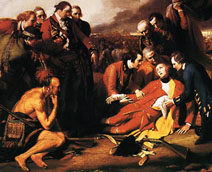 Our answer to this question is an unqualified no. And it is beyond our imagination how anyone familiar with Canada and its history today could seriously raise the prospect. People who like to play at re-enacting these ancient battles are obliged to consider their impact on present-day politics and society. The many citizens of the USA who are apparently involved in the project here might be excused for not appreciating just what their pastime means for the Canadian future. But, again, how anyone who lives in Canada could support the thing is puzzling at best. Our answer to this question is an unqualified no. And it is beyond our imagination how anyone familiar with Canada and its history today could seriously raise the prospect. People who like to play at re-enacting these ancient battles are obliged to consider their impact on present-day politics and society. The many citizens of the USA who are apparently involved in the project here might be excused for not appreciating just what their pastime means for the Canadian future. But, again, how anyone who lives in Canada could support the thing is puzzling at best.
The 1759 Battle of the Plains of Abraham, for those who may have forgotten, is what an earlier generation of anglophone francophobes used to call the "British Conquest of Canada" — and an earlier English Canadian anthem used to celebrate with "In days of yore from Britain’s shore / Wolfe the conquering hero bore," etc, etc, etc. What the bilingual and multicultural Canada of today ought to remember about the Battle of the Plains of Abraham is that both the French and English generals in charge of the two sides — Montcalm and Wolfe — died in the fighting. And the big fact to emerge from the battle for the future is that the French fact in Canada has lived on vigorously into the present, in various crucial senses.
 Happily, most recent media commentary has been in such broadly positive directions. See, e.g.: "Bataille des plaines d'Abraham — Annulez! dit Marois" ; "Don't refight the Plains of Abraham" ; "Battle site a loaded issue in Quebec" ; "Plains of Abraham re-enactment plan under fire" ; "History should sometimes just be history" (by Rod Love from Alberta, a former key figure in the world of Stephen Harper) ; and "Historic re-enactment re-opens old wounds." Happily, most recent media commentary has been in such broadly positive directions. See, e.g.: "Bataille des plaines d'Abraham — Annulez! dit Marois" ; "Don't refight the Plains of Abraham" ; "Battle site a loaded issue in Quebec" ; "Plains of Abraham re-enactment plan under fire" ; "History should sometimes just be history" (by Rod Love from Alberta, a former key figure in the world of Stephen Harper) ; and "Historic re-enactment re-opens old wounds."
It is especially unfortunate that this issue has arisen at a time when the forces of Quebec sovereignty, that have been thwarting Canada’s forward movement since the late 1960s, seem to be benignly abating as a dominant factor in both Canadian and Quebec politics. (And see here: "The 'mother country' gives Quebeckers a wake-up call" and "Le projet de souveraineté expliqué à Sarkozy.") People who believe in a vigorous Canadian future everywhere ought to agree with the current PQ leader Pauline Marois: we need a re-enactment of the Battle of the Plains of Abraham in the summer of 2009 like we need a hole in the head.
It’s not all bad news?
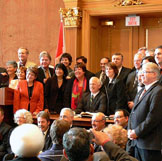 Who knows where Canadian stock markets will be at the end of trading Monday, February 9, 2009, let alone any further into the future. But it was encouraging that on this past Friday "TSX turns positive for 2009 as miners climb off the mat." Who knows where Canadian stock markets will be at the end of trading Monday, February 9, 2009, let alone any further into the future. But it was encouraging that on this past Friday "TSX turns positive for 2009 as miners climb off the mat."
It is said that US investors have been similarly encouraged by the prospect that some version of President Obama’s stimulus plan is actually going to happen. The far too many remaining blindly free-market ideologues ought to think about that.
We support stimulus plans ourselves, because we are concerned about our stock market investments. The North American economy worked best when it was most confidently "mixed" — in the generation immediately after the Second World War.
Meanwhile, Ms. Chantal Hebert has been reporting "Commons returning to civility" in Ottawa. And here’s hoping she is right about this. Far too many people in Canada have been turned off by the juvenile behaviour of their politicians over the past several years. Who knows? Fixing this could have a positive and constructive impact on the economy too.
Things really have begun to change in Canada ... whether it’s what the people who started it all intended ... and whether the rest of us like it or not?
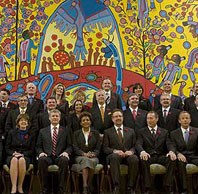 In some superficial ways, you might guess, not much has changed in Ottawa since the suddenly surprising heady days of late November and early December 2008, which saw both an unanticipated Liberal-NDP coalition (supported by the Bloc Quebecois), and an unprecedented prorogation of Parliament, to avoid the defeat of Mr. Harper's government on a non-confidence motion. In some superficial ways, you might guess, not much has changed in Ottawa since the suddenly surprising heady days of late November and early December 2008, which saw both an unanticipated Liberal-NDP coalition (supported by the Bloc Quebecois), and an unprecedented prorogation of Parliament, to avoid the defeat of Mr. Harper's government on a non-confidence motion.
We still have a Conservative minority government in office, led by Stephen Harper. There seems no immediate prospect of the government’s immediate defeat in the House, on a non-confidence motion — to face either a new opposition coalition government, or yet another federal election (following the most recent one this past October 14). The prorogation trick worked — as dubious (and still unsettling) as it certainly was (and is).
 Yet in other ways we share the sense that, not too far beneath the surface of events, something quite fundamental about Canadian federal politics actually has begun to change. Yet in other ways we share the sense that, not too far beneath the surface of events, something quite fundamental about Canadian federal politics actually has begun to change.
It isn’t the kind of change that those most loyal to Stephen Harper’s new Conservative Party of Canada have wanted to see. With a new budget that dramatically expands the deficit, that is clear enough. It doesn’t seem to be the kind of change that those hoping for a simple restoration of the old natural governing party of Canada, under the fresh leadership of Michael Ignatieff, want either. And it certainly doesn’t seem the kind of changed Canada that either Jack Layton or Gilles Duceppe would welcome. But Bob Rae’s instinct that something "clicked" at some point early this past December still seems intact. For want of better words, what William Kilbourn called "the peaceable kingdom" in Canada several decades ago now has vanished forever over the past few months. Of course no one knows exactly or at this point even vaguely what will replace it. But Canada is off on some version of a new journey forward — and (while we hope the "peaceable" part of the old formula lives on) that somehow seems to us a hopeful sign.
Earlier report, February 4: NEWFIE JOKE HELPS PUSH CANADIAN FEDERAL BUDGET THROUGH OTTAWA HOUSE .. and Iggy looks good!
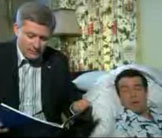 The Vancouver Sun has now reported that "Liberal Leader Michael Ignatieff defused a threatened rebellion by a handful of Newfoundland and Labrador MPs on Tuesday [February 3] by allowing them to break party ranks and lodge ‘a one-time vote of protest’ against the Conservative budget ... Ignatieff said the vote by six of 77 Liberals would ‘send a clear signal to Newfoundland and Labrador and to the whole of Canada that this is no way to run a federation.’" Meanwhile: "As expected, the Harper government easily cleared its latest parliamentary hurdle on Tuesday night, as the government’s main budget motion passed by a vote of 211–91 in the [Canadian] House of Commons. All Liberals except for the six from Newfoundland and Labrador supported the budget. The Bloc and the NDP opposed." To date we have not been enthusiastic supporters of "Iggy" ourselves. But in this latest installment of fast times in Canadian federal politics, we are beginning to think he may win the prize for looking the least absurd. (See below for further details. And for an excellent more general discussion of everything that has been going on in Ottawa since late this past November, check out the "Canada explained" item on Newfoundland native Rick Mercer’s CBC website.) The Vancouver Sun has now reported that "Liberal Leader Michael Ignatieff defused a threatened rebellion by a handful of Newfoundland and Labrador MPs on Tuesday [February 3] by allowing them to break party ranks and lodge ‘a one-time vote of protest’ against the Conservative budget ... Ignatieff said the vote by six of 77 Liberals would ‘send a clear signal to Newfoundland and Labrador and to the whole of Canada that this is no way to run a federation.’" Meanwhile: "As expected, the Harper government easily cleared its latest parliamentary hurdle on Tuesday night, as the government’s main budget motion passed by a vote of 211–91 in the [Canadian] House of Commons. All Liberals except for the six from Newfoundland and Labrador supported the budget. The Bloc and the NDP opposed." To date we have not been enthusiastic supporters of "Iggy" ourselves. But in this latest installment of fast times in Canadian federal politics, we are beginning to think he may win the prize for looking the least absurd. (See below for further details. And for an excellent more general discussion of everything that has been going on in Ottawa since late this past November, check out the "Canada explained" item on Newfoundland native Rick Mercer’s CBC website.)
Two additional points on the latest fast times seem worth noting too ...
 (1) Jane Taber reports in today’s [4 Feb 09] Globe and Mail: "Prime Minister Stephen Harper's former right-hand man warned Michael Ignatieff Tuesday [3 Feb 09] that his leadership could be in peril after his decision to allow a rebellion by his Newfoundland and Labrador MPs ... Tom Flanagan said following the "dictates" of Newfoundland and Labrador Premier Danny Williams by allowing the province's six Liberal MPs to vote against the Harper budget was the "easier course" to take for the Liberal Leader and will work "okay" in the short term. "But it is a sign of weakness in the brutal world of politics and will create problems in the longer run. Harper would never do something similar," said Mr. Flanagan, now a political science professor at the University of Calgary. (1) Jane Taber reports in today’s [4 Feb 09] Globe and Mail: "Prime Minister Stephen Harper's former right-hand man warned Michael Ignatieff Tuesday [3 Feb 09] that his leadership could be in peril after his decision to allow a rebellion by his Newfoundland and Labrador MPs ... Tom Flanagan said following the "dictates" of Newfoundland and Labrador Premier Danny Williams by allowing the province's six Liberal MPs to vote against the Harper budget was the "easier course" to take for the Liberal Leader and will work "okay" in the short term. "But it is a sign of weakness in the brutal world of politics and will create problems in the longer run. Harper would never do something similar," said Mr. Flanagan, now a political science professor at the University of Calgary.
Once again (see below) we think Prof. Flanagan is altogether wrong here. Or at least all he is doing is writing propaganda for his former boss, Mr. Harper. We think the fact that "Harper would never do something similar" is exactly what makes Mr. Ignatieff look so good. It’s like when President Obama says he "screwed up" on the Daschle nomination. And in our neck of the woods you could hear the applause ringing through the trees. That’s what the "Change" everyone wants really means, etc, etc, etc. In any proper democracy "rebellions" are things you listen to, not squash. Attilla the Hun is not the model leader for the 21st century, even in the "brutal world of politics" that will of course always be a rough game. Anyway the day when the Liberal Party of Canada starts taking advice from the likes of Tom Flanagan will be the day it’s really in trouble.
(2) On a much more relevant front, Chantal Hebert has an interesting column in today’s Toronto Star, entitled "Fallout from Commons crisis felt across country." The last sentence has some deep resonance in our ears: "Finally the two national progressive parties in the Commons go for each other's throat. The NDP takes the unusual step of launching attack ads against the Liberals, even as one in two of its own supporters actually thinks the budget should be allowed to pass."
Earlier report, February 3: HARPER’S FIGHT WITH THE ROCK COMPLICATES CANADIAN BUDGET PROGRESS .. slightly at least
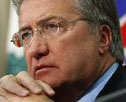 OTTAWA. TUESDAY, FEBRUARY 3. 12:05 AM ET. Several hours ago the Liberal amendment to the Conservative budget — requiring the federal government to submit three quarterly reports on progress in implementing the budget program — was passed by a vote of 214 to 84, with only the NDP and Bloc Québécois voting no. With his declared precondition having thus been met, Liberal leader Michael Ignatieff "said the Liberals had no intention of withdrawing support for the budget, despite a growing backlash within their ranks." Backlash, however, is almost certainly too strong a word. The key point is that four (and possibly five) of the six Liberal MPs from Newfoundland and Labrador now want to vote against the budget, in solidarity with provincial Premier Danny Williams’s complaint that it deprives the Rock of an estimated $1.5 billion in equalization payments (or federal-provincial transfers, or whatever you want to call them). And, despite what some suggest, it seems Ignatieff could come up smelling like a rose in almost all the current many Ottawa mansions by just letting those of his Newfoundland MPs who want to vote against the budget do just that — without any sanctions or other control-freak party disciplines. OTTAWA. TUESDAY, FEBRUARY 3. 12:05 AM ET. Several hours ago the Liberal amendment to the Conservative budget — requiring the federal government to submit three quarterly reports on progress in implementing the budget program — was passed by a vote of 214 to 84, with only the NDP and Bloc Québécois voting no. With his declared precondition having thus been met, Liberal leader Michael Ignatieff "said the Liberals had no intention of withdrawing support for the budget, despite a growing backlash within their ranks." Backlash, however, is almost certainly too strong a word. The key point is that four (and possibly five) of the six Liberal MPs from Newfoundland and Labrador now want to vote against the budget, in solidarity with provincial Premier Danny Williams’s complaint that it deprives the Rock of an estimated $1.5 billion in equalization payments (or federal-provincial transfers, or whatever you want to call them). And, despite what some suggest, it seems Ignatieff could come up smelling like a rose in almost all the current many Ottawa mansions by just letting those of his Newfoundland MPs who want to vote against the budget do just that — without any sanctions or other control-freak party disciplines.
Iggy can’t lose by letting Rock MP s do what they feel they have to?
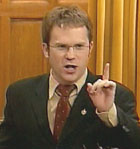 As it happens, this strategy has already been popularly endorsed by at least two commentators on the version of Joan Bryden’s Canadian Press report on the subject, published in the Toronto Globe and Mail. Bill W from Toronto, Canada, e.g., writes: "Even though this is being made to seem bad for the Libs, I see it as being some Liberal MPs that are actually doing what they've been elected to do as opposed to all Tories who always vote with the party even though the budget could be harming their riding." As it happens, this strategy has already been popularly endorsed by at least two commentators on the version of Joan Bryden’s Canadian Press report on the subject, published in the Toronto Globe and Mail. Bill W from Toronto, Canada, e.g., writes: "Even though this is being made to seem bad for the Libs, I see it as being some Liberal MPs that are actually doing what they've been elected to do as opposed to all Tories who always vote with the party even though the budget could be harming their riding."
Political Solutions from Kitchener, Canada adds: " I think it would be a smart move by Iggy to allow his Party members to vote as they choose ... This way he shows ... that he’s... not a control freak like Harper ... If his party votes mostly in favour of the budget [which does seem virtually certain at this point] he can claim that his Party is acting responsibly in this economic crisis by supporting the spending."
Ignatieff could get into some trouble following this line, of course, if too many Liberal MPs — beyond Newfoundland and Labrador — also wanted to vote against the budget. But, though there has been some not-all-that-surprising Grit partisan fervour against the Harper minority government’s financial plans, as Ms. Bryden has urged "most Liberals will support the budget Tuesday." (And thus the thing should finally be suitably blessed by the Canadian House of Commons later today.)
Meanwhile, if Mr. Ignatieff lets his Newfoundland MP s vote against the budget, without any sanction or punishment for breaking party discipline, he and his party will remain popular on the Rock. And at the same time, the majority of Liberals in the House will have backed the budget — which is what the Canada-wide majority of voters seem to want at the moment too.
Iggy adoration back east ... but not the same out west?
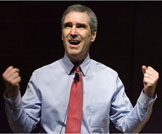 Meanwhile again, it is also interesting how major Canadian newspapers east of the Ontario-Manitoba border gave some prominent attention to reports about the laudatory article on Michael Ignatieff in this past weekend’s New York Times. Check out: "Ignatieff subject of fawning Times profile" in the Globe and Mail, "Le New York Times louange Ignatieff" in Le Devoir, and "New York Times gives Ignatieff standing O," in the Halifax Chronicle Herald. For the original piece in the New York Times see "Running on Book Sense and Charm." Meanwhile again, it is also interesting how major Canadian newspapers east of the Ontario-Manitoba border gave some prominent attention to reports about the laudatory article on Michael Ignatieff in this past weekend’s New York Times. Check out: "Ignatieff subject of fawning Times profile" in the Globe and Mail, "Le New York Times louange Ignatieff" in Le Devoir, and "New York Times gives Ignatieff standing O," in the Halifax Chronicle Herald. For the original piece in the New York Times see "Running on Book Sense and Charm."
On the other hand, this kind of interest in the somewhat Trudeauesque "Iggy" is much harder or even virtually impossible to see west of the Lake of the Woods in northwestern Ontario. Today the Calgary Herald was much more interested in the New Brunswick controversy over singing "O Canada" in the schools (see "Oh, Canada! True north strong and politically correct").
This past Friday Barbara Yaffe of the Vancouver Sun had a column headed "NDP heaps scorn on coalition-killer Ignatieff." Ms. Yaffe feels that the anti-Iggy NDP radio commercials (which have so distressed us below) constitute "good strategy for the New Democrats, who understand their party has nothing to gain and everything to lose through Ignatieff's decision to reassert a stand-alone Liberal identity in Ottawa ... If Ignatieff's plan works, a strengthened Liberal party probably would steal support from New Democrats. That's a trend New Democrats must thwart."
(Needless to say we think all this is lamentable — and quite wrong strategically, unless you actually do support the Harper Conservatives! There is nothing incompatible at all between "stand-alone" identities for both the Liberals and New Democrats, and friendly co-operation between the two parties on the left or progressive side of the political spectrum. What Mr. Layton is doing now can only finally work to the benefit of Mr. Harper and the Conservatives. Which only makes you wonder if that is who Ms. Yaffe secretly supports herself?)
Earlier report, January 28: WHY CAN'T THE LIBERALS AND NEW DEMOCRATS JUST GET ALONG .. and stop making Stephen Harper happy?
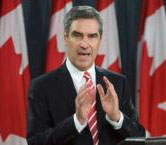 OTTAWA. WEDNESDAY, JANUARY 28, 2009. 3 PM ET. Now we know what kind of amendment Liberal leader Michael Ignatieff is going to propose to the Conservative minority government’s new flip-flop budget (or in the other official language "un budget conservateur aux accents libéraux"), as a condition of voting for the thing — apparently early next week. In a nutshell: "Ignatieff wants regular updates on budget's impact." We also know the reaction of Mr. Ignatieff’s erstwhile opposition coalition partners to his budget plans. And, beyond "Tears, Idle Tears," all any Canadian voter who would like to see a real progressive government in Ottawa can say here is that it’s probably a good thing the proposed Liberal-NDP coalition of late last year did not actually take office. Based on New Democrat leader Jack Layton’s petulant reaction to Mr. Ignatieff’s not entirely surprising or obviously ill-advised response to the new interventionist Harper budget, any coalition government that included Mr. Layton would have soon self-destructed in any case. Or, as another current news headline has declared: "Tories put on probation; coalition declared dead ... To Layton's chagrin, Ignatieff says he is prepared to 'swallow hard' and support budget so long as Harper releases regular economic status reports." More succinctly again: "Liberals back budget, with conditions ... NDP outraged at 'new coalition'." OTTAWA. WEDNESDAY, JANUARY 28, 2009. 3 PM ET. Now we know what kind of amendment Liberal leader Michael Ignatieff is going to propose to the Conservative minority government’s new flip-flop budget (or in the other official language "un budget conservateur aux accents libéraux"), as a condition of voting for the thing — apparently early next week. In a nutshell: "Ignatieff wants regular updates on budget's impact." We also know the reaction of Mr. Ignatieff’s erstwhile opposition coalition partners to his budget plans. And, beyond "Tears, Idle Tears," all any Canadian voter who would like to see a real progressive government in Ottawa can say here is that it’s probably a good thing the proposed Liberal-NDP coalition of late last year did not actually take office. Based on New Democrat leader Jack Layton’s petulant reaction to Mr. Ignatieff’s not entirely surprising or obviously ill-advised response to the new interventionist Harper budget, any coalition government that included Mr. Layton would have soon self-destructed in any case. Or, as another current news headline has declared: "Tories put on probation; coalition declared dead ... To Layton's chagrin, Ignatieff says he is prepared to 'swallow hard' and support budget so long as Harper releases regular economic status reports." More succinctly again: "Liberals back budget, with conditions ... NDP outraged at 'new coalition'."
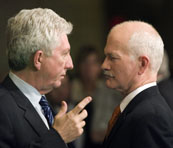 The "new coalition" that Mr. Layton has alleged is one between the Harper Conservatives and the Ignatieff Liberals. And, coming from the man who originally dumped the Paul Martin Liberal minority government a few years ago now — and at last cleared a path to minority-government power for the Harper Conservatives — this is a little too cute. (Or, as the old colonial masters used to say, "too clever by half.") The "new coalition" that Mr. Layton has alleged is one between the Harper Conservatives and the Ignatieff Liberals. And, coming from the man who originally dumped the Paul Martin Liberal minority government a few years ago now — and at last cleared a path to minority-government power for the Harper Conservatives — this is a little too cute. (Or, as the old colonial masters used to say, "too clever by half.")
To us at any rate, it seems more than arguable that inept and on some occasions just plain stupid strategy, on the part of Mr. Layton’s New Democratic Party, has had more to do with keeping the Harper Conservative minority government in office than any other single raw political factor (including the Liberal leadership of Stephane Dion).
And today, after his apparently brief autumn of common sense, Mr. Layton was back to his usual rant about how any party that finally wound up supporting the Conservatives as often as the Liberals have over the past few years couldn’t seriously pose as an alternative to the Conservatives. Canadian voters who wanted a real alternative to Mr. Harper’s government should consider voting for Mr. Layton and his party, instead of Mr. Ignatieff and his party.
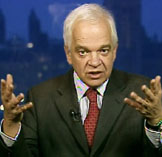 Mr. Layton has been advising Canadian federal voters this way for a number of years now, and — outside certain parts of Western Canada — they have shown little interest in taking his advice. He seems more and more like a political opportunist with a tin ear, and a defective understanding of political history, in Canada and most other parts of the global village. If he had what it will take to help bring an authentic progressive Canadian federal government to Ottawa, we think, he would have been much more cunning in his reaction to Mr. Ignatieff’s current stewardship of his role as leader of the official opposition — and more concerned to show some kind of continuing solidarity with his coalition partner of just a few months ago. Now it just seems that moving the cause of progress ahead in Canada over the next while is going to take a degree of maturity and political horse sense that is altogether foreign to Mr. Layton’s self-righteous cast of mind. Mr. Layton has been advising Canadian federal voters this way for a number of years now, and — outside certain parts of Western Canada — they have shown little interest in taking his advice. He seems more and more like a political opportunist with a tin ear, and a defective understanding of political history, in Canada and most other parts of the global village. If he had what it will take to help bring an authentic progressive Canadian federal government to Ottawa, we think, he would have been much more cunning in his reaction to Mr. Ignatieff’s current stewardship of his role as leader of the official opposition — and more concerned to show some kind of continuing solidarity with his coalition partner of just a few months ago. Now it just seems that moving the cause of progress ahead in Canada over the next while is going to take a degree of maturity and political horse sense that is altogether foreign to Mr. Layton’s self-righteous cast of mind.
Bloc Quebecois leader Gilles Duceppe, alas, had a somewhat similar reaction to Mr. Ignatieff’s budget amendment proposal. In almost identical rants in both French and then English he belittled Ignatieff’s concept of a progress report in March (when Mr. Ignatieff would again say "Canadians need a fresh election like a hole in the head," etc), and then June (when he would say the same thing yet again, etc, etc), and on and on.
M. Duceppe, however, seemed more sanguine about future prospects for a revived coalition of the left than Mr. Layton. M. Duceppe’s main practical criticism of the new flip-flop budget also echoed a coterminous headline in Le Devoir: "Québec se voit largué au profit de l'Ontario." (I.e., Quebecers who really want to put Quebec first shouldn’t waste any votes on any of the Liberals, Conservatives, or New Democrats. They should just stick with the proven regional patriots in the Bloc Quebecois.)
 None of this is to say that Michael Ignatieff’s new strategy for dealing with Canada’s current fractured federal political culture is remotely perfect, or at all blameless. Like others among his supporters, he still seems to think that he can become prime minister of Canada as just leader of the tried and true Liberal Party of Canada and nothing else. None of this is to say that Michael Ignatieff’s new strategy for dealing with Canada’s current fractured federal political culture is remotely perfect, or at all blameless. Like others among his supporters, he still seems to think that he can become prime minister of Canada as just leader of the tried and true Liberal Party of Canada and nothing else.
The possibility that things have changed radically in the more recent past — and that the Liberals and New Democrats are going to need each other to make real progress in the near future — still seems to have not quite settled in Mr. Ignatieff’s mind. We also still think that the Liberals are going to have to think hard about some renovated strategy of abstaining from Commons votes down the road, as some remarks by Jane Taber on CTV vaguely alluded to today as well.
Nonetheless, Mr. Ignatieff has come up with something of a slightly fresh tactic in his new budget amendment strategy. He and Mr. Layton apparently had a good enough meeting only a few weeks ago. It remains disappointing that all three opposition parties have so quickly not managed to retain even a thin veneer of their newly found unity late this past year. Or, as a headline in the Halifax Chronicle Herald has explained: "Ignatieff puts Tories 'on probation' ... Coalition implodes as Liberal leader calls for budget progress reports." Whatever, keep staying tuned, for further developments! The smart money is saying the Conservatives will accept Mr. Ignatieff’s conditions, and the budget will pass next week. But something slightly more interesting could conceivably lie ahead. (Or not ... and, as an update the morning after, it is now unmistakably clear that the Conservatives will accept the conditions and Mr. Ignatieff will bless the budget "on probation," as he has rather lamely said. Meanwhile, we already have "NDP ad blitz heaps scorn on Ignatieff," which can only bring still more "Tears, Idle Tears" back to any Canadian voter who would like to see a real progressive government in Ottawa, antime soon!)
Earlier report, January 28: HOW FINE A LINE WILL LIBERALS TRY TO CUT .. and just how many Canadian people are really watching?
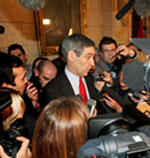 OTTAWA. WEDNESDAY, JANUARY 28, 2009. 1 AM ET. So the Harper Conservative minority government has finally released its "flip-flop budget" in full. As expected the Bloc Quebecois and the New Democrats have said they will not support the new federal financial plan, despite its attempt to show at least some money to almost every square inch of the confederation. (Well ... there are apparently one or two parts of Baffin Island that got left out.) OTTAWA. WEDNESDAY, JANUARY 28, 2009. 1 AM ET. So the Harper Conservative minority government has finally released its "flip-flop budget" in full. As expected the Bloc Quebecois and the New Democrats have said they will not support the new federal financial plan, despite its attempt to show at least some money to almost every square inch of the confederation. (Well ... there are apparently one or two parts of Baffin Island that got left out.)
New Democrat leader Jack Layton has used Liberal leader Michael "Ignatieff's words [from a while ago now], saying the budget fails to ‘protect the vulnerable, doesn't create jobs for today and doesn't create jobs for tomorrow.’" Layton has also "said it would be ‘wrong-headed’ for the Liberals to ‘prop up the Harper government’ and that the coalition should be allowed to offer its economic recovery plan."
Meanwhile, the new Ignatieff Liberals are not exactly talking about their one-time "coalition" with the "socialist" New Democrats (and supported by the dread "separatists" in the BQ). But, just to keep us political junkies suitably amused, they are still trying to show they have a trick or two up their sleeve. According to the Globe and Mail: "Ignatieff to call for changes to budget ... Liberals unlikely to vote for current plan ... Liberal MPs emerged from a meeting last night saying they expect their leader, Michael Ignatieff, will demand changes to yesterday's Conservative budget in return for their support."
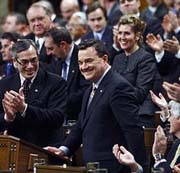 What happens if the Conservatives are not willing to agree to the Liberal changes? Probably not a switch to the Liberal-NDP coalition, backed by the BQ — as proposed late last year, in the wake of the near insane Conservative minority government’s alleged "financial update." According to one Liberal MP in the here and now of late January 2009: "Obviously, that could still lead to an election if they're not co-operative." (I.e., an election not a coalition is what the Liberals now seem to have in mind, despite the continuing rumblings from their New Democrat friends, etc.) What happens if the Conservatives are not willing to agree to the Liberal changes? Probably not a switch to the Liberal-NDP coalition, backed by the BQ — as proposed late last year, in the wake of the near insane Conservative minority government’s alleged "financial update." According to one Liberal MP in the here and now of late January 2009: "Obviously, that could still lead to an election if they're not co-operative." (I.e., an election not a coalition is what the Liberals now seem to have in mind, despite the continuing rumblings from their New Democrat friends, etc.)
At the same time: "‘I think the objective for the Liberal Party is to let Canadians know that they do have a different vision of the country,’ said another MP." The same source "said there would be some Liberal positioning on the issue, but that more individuals [in the Liberal caucus] were leaning toward letting the government live than pushing to defeat it."
What would a proposed amendment say? According to the Globe and Mail: "At the top of the Liberals' concerns were objections that there was not enough softening of the employment-insurance rules, and that the tax cuts announced yesterday could leave the federal government mired in deficit years from now, even after the economy recovers."
As explained further in the Toronto Star: " Liberals privately suggested an amendment could include a proviso that municipalities receive their share of federal infrastructure funding, even if they can't afford to ante up matching funds. It could also specify that the unemployed must receive jobless benefits immediately, doing away with the two-week waiting period." Meanwhile, Conservative finance minister (and the man theoretically in charge) Jim Flaherty "declined to discuss whether he's willing to change such elements of his budget."
 It is apparently still expected that all this will be resolved by Thursday at the latest, or even later today. Our own current untutored guess is that Mr. Ignatieff’s re-grouping Liberal Party of Canada just wants to show its own colours (and/or even those of its other progressive opposition majority partners?) one last time — before assenting to the main thrust of a Harper Conservative budget that already looks quite a lot like an old-fashioned Liberal budget (even without any further amendments from the particular Liberals of today). It is apparently still expected that all this will be resolved by Thursday at the latest, or even later today. Our own current untutored guess is that Mr. Ignatieff’s re-grouping Liberal Party of Canada just wants to show its own colours (and/or even those of its other progressive opposition majority partners?) one last time — before assenting to the main thrust of a Harper Conservative budget that already looks quite a lot like an old-fashioned Liberal budget (even without any further amendments from the particular Liberals of today).
We will, however, be keeping our ears to the ground for further developments. So stay tuned. We will be pronouncing our own modest benedictions over whatever finally does happen, whenever it happens.
And, again, who knows? Something even crazier than anything that has yet happened in this especially crazy season of Canadian federal politics still seems possible — if not really likely (for the moment at least!).
Earlier report, January 25: THE RETURN OF THE DUBIOUSLY PROROGUED PARLIAMENT .. who knows what the future will bring?
 The Parliament of Canada that Prime Minister Harper convinced Governor General Jean to shut down last month, to avoid the defeat of his Conservative minority government in a non-confidence vote, is back on Monday, January 26. On January 27 the Conservatives will present a budget which seems close to the exact opposite of their financial update several weeks ago. (And that ideologically charged financial update was what prompted the opposition majority to unite against the government in the first place.) The Parliament of Canada that Prime Minister Harper convinced Governor General Jean to shut down last month, to avoid the defeat of his Conservative minority government in a non-confidence vote, is back on Monday, January 26. On January 27 the Conservatives will present a budget which seems close to the exact opposite of their financial update several weeks ago. (And that ideologically charged financial update was what prompted the opposition majority to unite against the government in the first place.)
The official Conservative change of heart should be enough to convince at least the official opposition Liberals to support the new budget (or at worst abstain from voting against it?), and keep the minority government in office, for the time being. And this would seem to be what the largest part of the wider public wants, in the midst of growing economic troubles in virtually all parts of Canada, as in most of the rest of the global village.
On the other hand, it also appears that there may still be a few uniquely partisan twists in the January 27 budget document. The new aging-rock-star Liberal leader Michael Ignatieff has said : "I asked Mr. Harper not to play games ... But the guy can't help himself. He thinks it is all some kind of game." And so on Saturday, January 24 James Travers wrote in the Toronto Star: "Common sense argues for muddling through next week. Cynicism advises Canadians to gird for the worst." And who knows? He may be right — in either case!
Majority backs deficit ...
 According to the Vancouver Sun: "A slim majority of Canadians support running a major deficit to stimulate the economy, a new poll shows, as the Harper government prepares to unveil a budget that will push Canada $34 billion into the red next year. According to the Vancouver Sun: "A slim majority of Canadians support running a major deficit to stimulate the economy, a new poll shows, as the Harper government prepares to unveil a budget that will push Canada $34 billion into the red next year.
"Fifty-three per cent of Canadians believe the government must run a deficit of at least $30 billion to $40 billion to ‘stimulate the economy and get us out of this recession,’ according to the poll, conducted by Ipsos Reid on behalf of Canwest News Service and Global National."
It is this fresh willingness to indulge in such comparatively massive stimulative spending by the federal government, on the part of the Harper Conservatives, that is supposed to convince the official opposition Liberals to support the new budget — or at least to abstain from voting against it. (And without Liberal support the opposition New Democrats and Bloc Quebecois do not have enough MP s to defeat the Harper minority government’s budget legislation — as they have already indicated they would like to do, come what may.)
As usual there are some interesting regional variations in the new Ipsos Reid poll on the projected deficit. But this time they do not quite reflect what is often seen as the usual east-west divide: "Support for a major deficit was strongest in British Columbia and Atlantic Canada, where 57 per cent of respondents backed it ... In Ontario, 56 per cent supported major deficits, followed by Quebec at 51 per cent and Alberta at 48 per cent. Support was lowest in Saskatchewan and Manitoba, where only 40 per cent backed the notion."
"Harper talks permanent tax cuts" ... a possible fly in the ointment?
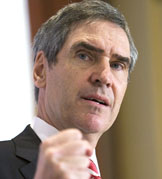 It is also being reported that "Prime Minister Stephen Harper on Friday said next week's budget will contain some permanent tax measures as he and his ministers began explaining to the country what Canadians will get in return for a deficit that, next year, will put the federal treasury into a $34-billion hole. It is also being reported that "Prime Minister Stephen Harper on Friday said next week's budget will contain some permanent tax measures as he and his ministers began explaining to the country what Canadians will get in return for a deficit that, next year, will put the federal treasury into a $34-billion hole.
"Harper has said most of the initiatives in the stimulus package to be unveiled next week will be temporary, designed to naturally expire as Canada's economy begins to grow again. But in an exclusive interview with the Global Television show Focus Ontario, to air Saturday at 6:30 E.T., Harper said the budget also will include some items that will outlast the economic downturn ... ‘There will be some tax measures and some of those measures will be permanent, but the tax measures are modest and they're affordable in the long term,’ Harper said."
Some say these "permanent tax cuts" are designed to appeal to the Conservative political base, in a budgetary regime that many Conservative supporters are otherwise bound to find uncongenial. But permanent tax cuts may rather seriously annoy the Ignatieff Liberals as well — and conceivably give grounds for who knows just what?
As evidence that Liberal unhappiness on these grounds is still not too likely to lead to an actual defeat of the Harper minority government’s budget legislation, it is intriguing that the government has "also announced the creation of two new regional economic development agencies, one for southern Ontario and one for northern Canada." A regional development agency for southern Ontario shows just how much things have changed in Canada lately. And it is probably not something the Liberals will want to oppose.
Thirty-five law professors and political scientists are still saying give some kind of opposition coalition a chance ... if and when etc ...
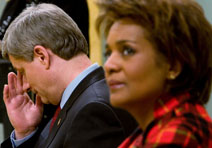 Suppose, as James Travers has suggested is still remotely conceivable, common sense does ultimately not prevail, and for one or another cynical and/or game-playing reason (on Mr. Harper’s part, e.g.), the opposition parties actually do unite to defeat the Conservative minority government over its financial plans — as they were in fact about to do just before the dubious prorogation of Parliament last month? Suppose, as James Travers has suggested is still remotely conceivable, common sense does ultimately not prevail, and for one or another cynical and/or game-playing reason (on Mr. Harper’s part, e.g.), the opposition parties actually do unite to defeat the Conservative minority government over its financial plans — as they were in fact about to do just before the dubious prorogation of Parliament last month?
Concerned that in another "recent Ipsos Reid poll, 51% of participants mistakenly thought that Canadians directly elect their Prime Minister," a group of 35 Canadian constitutional lawyers and political scientists have felt "that it is our duty, as constitutional scholars, to clarify for the public the rules governing the appointment of government" under Canada’s time-honoured political system of parliamentary democracy.
These scholars (who include the likes of: Stéphane Beaulac, Université de Montréal ; Duncan Cameron, Simon Fraser University ; David Docherty, Wilfrid Laurier University ; C.E.S. (Ned) Franks, Queen's University ; Andrew Heard, Simon Fraser University ; Martha Jackman, University of Ottawa ; Lucie Lemonde, Université du Québec à Montréal ; Heather MacIvor, University of Windsor ; Errol P. Mendes, University of Ottawa ; Dianne Pothier, Dalhousie University ; Peter H. Russell, University of Toronto ; François Tanguay-Renaud, Osgoode Hall Law School ; Paul G. Thomas, University of Manitoba ; Jeremy Webber, University of Victoria ; and Margot Young, University of British Columbia) do not believe that yet another federal election would be well-advised under the present circumstances.
Instead, as they put it themselves: "It is our opinion that in the event of a non-confidence vote or a request for dissolution of Parliament after only 13 sitting days of the House of Commons, the Governor General would be well-advised to call the leader of the opposition to attempt to form a government. This would be most appropriate in the circumstances where that leader has already gathered the assurance that he would enjoy the support of a majority of votes on any issue of confidence for the next year or so. The principle of democracy would be protected in so far as the new government would enjoy the support of a majority of the elected officials. This would ensure the stability of our political system."
"Liberals gain steam as economy sputters" in latest opinion poll ...
 Opinion polls continue to suggest that, whatever else, the big burst in popular support which the Harper Conservatives managed to gain in the immediate wake of the, as it were, coalition and prorogation crisis of early last month has not endured. According to the Toronto Globe and Mail this past week: "Liberal Leader Michael Ignatieff has quickly boosted popular support for his party and a possible coalition with the NDP, and is seen as the best leader to work with U.S. President Barack Obama, a new poll has found. Opinion polls continue to suggest that, whatever else, the big burst in popular support which the Harper Conservatives managed to gain in the immediate wake of the, as it were, coalition and prorogation crisis of early last month has not endured. According to the Toronto Globe and Mail this past week: "Liberal Leader Michael Ignatieff has quickly boosted popular support for his party and a possible coalition with the NDP, and is seen as the best leader to work with U.S. President Barack Obama, a new poll has found.
"The Ekos poll suggests the Liberal Party is gaining momentum as economic concerns grow, with a majority of Canadians now holding a negative view of Conservative Leader and Prime Minister Stephen Harper. Of the 1,000 respondents, 55 per cent disapproved of Mr. Harper's handling of his responsibilities, while 35 per cent offered their approval ... Mr. Ignatieff, who has been leading the Liberal Party since Dec. 10, has the approval of 44 per cent of respondents and is seen negatively by only 21 per cent of them. However, the numbers show that many Canadians are still waiting to make up their minds about the new Liberal Leader, with 35 per cent of respondents refusing to offer an assessment."
On a related front: "Polls conducted late last year showed a high level of opposition, especially outside Quebec, to a proposed Liberal-NDP coalition in the event the minority Harper government is defeated in the House. The new poll suggests Canadians' feelings have evolved, with 50 per cent of respondents favouring a coalition government, while 43 per cent are happier with the current Conservative government ... ‘This is a huge change from the period right after the coalition agreement was struck in Stéphane Dion's last days as Liberal leader, when the Tories took an apparently unassailable 20-point lead,’ [pollster Frank] Graves said. ‘Clearly much of the recoil against the idea of a coalition really had to do with alarm at the idea of Stéphane Dion becoming prime minister so quickly after having been rejected so decisively [in the October 14, 2008 general election].’"
At the same time: "Still, the Conservative Party continues to lead in overall voting intentions in Canada, with the support of 36.2 per cent of respondents, compared with the Liberals at 32.6 per cent and the NDP at 14.3 per cent ... In addition, the poll suggests that 49 per cent of Canadians want to see Governor-General Michaëlle Jean send the country to the polls if the Harper government is defeated on its budget, instead of allowing a coalition government."
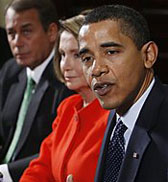 On the other hand again, there is also "a feeling that on the key Canada-US relationship, the Liberals are better positioned to deal with the new Obama administration in Washington. Asked which leader ‘would be best able to forge a positive working relationship’ with Mr. Obama, more respondents chose Mr. Ignatieff (51 per cent) than Mr. Harper (31 per cent)." On the other hand again, there is also "a feeling that on the key Canada-US relationship, the Liberals are better positioned to deal with the new Obama administration in Washington. Asked which leader ‘would be best able to forge a positive working relationship’ with Mr. Obama, more respondents chose Mr. Ignatieff (51 per cent) than Mr. Harper (31 per cent)."
So ... probably both the Harper minority government and its new January 27 budget are going to survive for a while longer, with some kind of help from the official opposition Liberals. But don’t be too surprised if there are some further surprises for those of us who are still enjoying the wild and almost wonderful world of Canadian federal politics in the new year 2009.
And who really knows just how much longer the current regime in Ottawa can last? Mr. Harper’s strongest card at the moment would seem to be the new Ignatieff Liberal Party’s desire to see the Conservatives get stuck with responsibility for whatever deeper economic difficulties lie ahead.
(And, unlike some other commentators, we don’t really think it makes the Liberals look bad at all to systematically abstain from voting on controversial Conservative legislation — in an effort to evade responsibility for Mr. Harper’s most mercurial policy impulses, while giving him just enough rope to hang himself with nicely, before the Canadian economy starts to improve, whenever that may really prove to be. Especially if the New Democrats and the Bloc Quebecois are effectively in on the plot, and quietly support the Liberal abstentions, until the time to bring the Conservatives down — and the economy up — is altogether ripe. The economy of course is what we’re all worried about right now. And rightly so. But for political junkies in Canada at least politics never quite goes out of style. Just ask Stephen Harper himself.) Only registered users can write comments.
Please login or register. Powered by AkoComment 1.0 beta 2!
|
